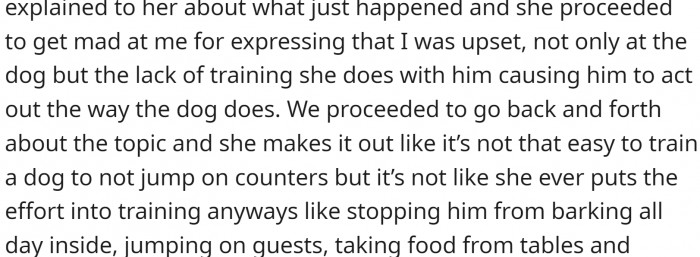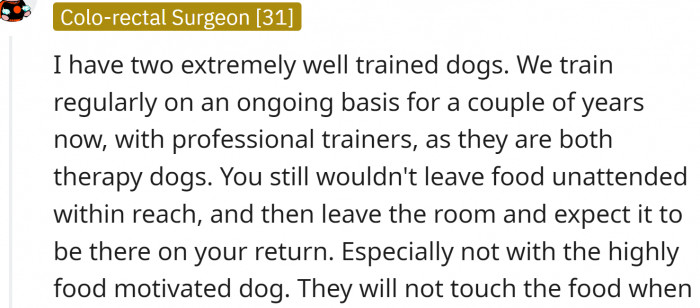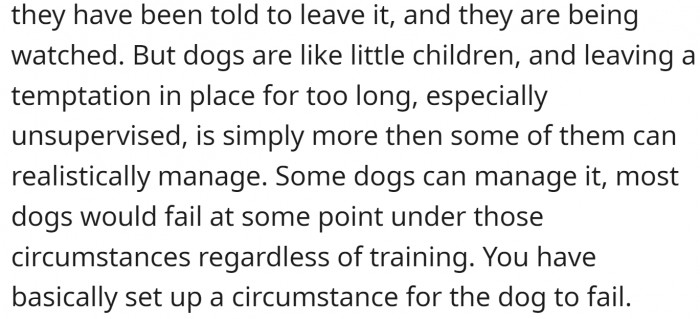Angry Teen Vents Online About Her Mom's Dog Stealing Her Lunch - Again
Some dogs have insatiable appetites and simply can’t resist food. Labs, for instance, are notorious for their appetites.
But they are not the only ones. Frankly, even most humans are food-driven.
We can’t blame them; food is so great. Some dogs (and people, to be honest) just can’t get enough of it.
This can cause a lot of problems because dogs have no inhibitors and act on instinct. The only way to prevent them from stealing food is through training.
You can’t just tell them to leave the food alone and trust them to listen; you have to train them.
Even with trained dogs, you can’t be sure that the dog will not succumb to temptation if you leave it alone. One Redditor went online to share their story of a food-stealing dog.
This unfortunate event happened recently when they left a sandwich unattended on the kitchen counter.
OP came back, only to discover that their sandwich had been taken and eaten by her mom's dog. OP was upset and started yelling at the dog.
Their mom came when she heard the noise and began arguing with OP.
So, now this Redditor asks: “AITA for yelling at my mom over her untrained dog?” Read the full story below:
OP asks:

This unfortunate event happened recently. They left a sandwich unattended on the kitchen counter.

OP came back, only to discover that their sandwich was taken and eaten by her mom's dog.

Understanding the behavioral dynamics between pets and their owners can shed light on familial relationships. Dr. John Archer, a psychologist at the University of Central Lancashire, notes that pets often serve as emotional support systems, enhancing feelings of security and affection within the household.
However, when pets misbehave, such as stealing food, it can frustrate family dynamics. Archer's research emphasizes that addressing behavioral issues in pets requires a collaborative approach, encouraging open dialogue among family members while implementing consistent training methods.
Emotional Regulation Strategies
Adolescents often struggle with emotional regulation, particularly in frustrating situations like a dog stealing food. Research published in the Journal of Adolescence highlights that teaching emotional regulation strategies can significantly improve coping mechanisms.
Parents can model these strategies, such as deep breathing or taking a moment to reflect before reacting. By equipping their teens with these tools, they can better navigate their frustrations, leading to healthier family interactions and reduced conflict.
Understanding Frustration with Pets
Dr. Sophie Reynolds, a behavioral psychologist at UCLA, explains that frustration with pets can often stem from unmet expectations.
Her research indicates that pet owners often project human-like qualities onto their animals, leading to disappointment when pets fail to behave as desired.
This can create tension, especially in shared living situations where boundaries need to be established.
OP was upset, and they started yelling at the dog. Their mom came when she heard the noise and started arguing with OP.

This dog has no training - jumps on people, eats from the trash can, steals food...

Redditors seem to believe that the guilt is shared - you don't leave food outside around a dog that's a proven food thief.

The Role of Communication
Effective communication is crucial in resolving conflicts, especially when it comes to shared responsibilities like pet care. According to a study published in the Journal of Family Psychology, families that engage in open dialogue report higher satisfaction and fewer conflicts.
Involving all family members in the training process of the dog may help alleviate frustrations and create a sense of shared responsibility. This collaborative effort can build stronger familial bonds and ensure that everyone's needs and concerns are addressed.
Behavioral psychology suggests that training pets effectively requires patience and consistency.
Research shows that positive reinforcement techniques are the most effective ways to encourage desired behaviors in animals.
When pet owners understand the principles of animal behavior, they can develop more effective training strategies.
Redditors who have experience with trained dogs also say - don't trust dogs around food

Dogs are like children - do not tempt them for too long. It is more than they can handle.

OP knew the dog wouldn't be able to resist temptation.

Research indicates that adolescent frustrations can stem from unmet expectations in familial relationships. Dr. Laura Padilla-Walker from Brigham Young University found that teenagers often feel a sense of injustice when their needs are overlooked, as in the case of the dog stealing lunch.
This emotional response is linked to the adolescent's developing sense of autonomy. To ease tensions, parents could establish clear boundaries and expectations regarding both pet behavior and family responsibilities to promote mutual respect.
Communication in Shared Spaces
Living with others requires effective communication, especially when it comes to shared responsibilities like pet care.
Studies indicate that clear discussions about expectations can reduce conflicts and improve relationships.
When everyone is on the same page, it creates a more harmonious living environment.
Containers, fridge, and microwave are all nice places to hide food, and it doesn't take more than five seconds to do so.

OP and their mom are both to blame

Cats are not much different

Training as a Family Activity
Integrating dog training into family routines can foster teamwork and understanding. A study published in the Journal of Applied Animal Welfare Science highlights that involving children in pet care responsibilities can improve their empathy and sense of responsibility.
Parents should encourage their teens to participate actively in training the dog, creating opportunities for shared experiences. This approach not only helps the dog learn but also cultivates family cohesion, as everyone works towards a common goal.
Finding common ground on pet care can enhance living arrangements.
Research suggests that when individuals actively engage in discussing their feelings and preferences, they are more likely to reach a satisfactory compromise.
This approach fosters cooperation and respect among roommates or family members.
According to the OP, the problem is:

Training is needed

OP should've put it away

Behavioral psychology suggests that reinforcing positive behaviors can effectively address issues like food stealing in dogs. According to research by Dr. Karen Overall, a veterinary behaviorist, reward-based training is more effective than punishment.
Consistently rewarding the dog for appropriate behavior, such as waiting for food, can minimize the likelihood of stealing. This principle of positive reinforcement can also extend to family dynamics, encouraging cooperation and patience among family members in resolving conflicts.
The Role of Empathy in Relationships
Empathy plays a critical role in managing frustrations in shared living situations.
According to psychological research, being able to understand and appreciate another person's perspective can mitigate conflicts.
Practicing empathy can lead to kinder interactions and better outcomes in shared living arrangements.
Redditors seem to believe that the guilt is shared - you don't leave food outside around a dog that's a proven food thief. Redditors who have experience with trained dogs also say - don't trust dogs around food.
Dogs are like children - do not tempt them for too long. It is more than they can handle.
OP knew the dog wouldn't be able to resist temptation. Containers, fridges, and microwaves are all nice places to hide food, and it doesn't take more than five seconds to do so.
Don't leave food in the open around dogs. That's it.
Psychological Analysis
This scenario showcases the challenges of cohabitation and the need for clear communication about expectations. It's essential for all involved to express their feelings openly to create a more supportive and understanding environment.
Analysis generated by AI
Analysis & Alternative Approaches
Frustrations with pets often highlight underlying issues in communication and expectation management in shared living situations.
Understanding animal behavior and practicing effective communication can significantly enhance the quality of life for both humans and their pets.
Clinical Perspective & Next Steps
Understanding the interplay between pets and family dynamics is essential for fostering harmonious relationships. Research emphasizes the importance of effective communication, shared responsibilities, and emotional regulation in mitigating conflicts.
By collaborating on training strategies and involving all family members in pet care, families can strengthen their bonds while effectively addressing behavioral issues. These evidence-based approaches not only improve the dog's behavior but also promote resilience and cooperation within the family unit, leading to a healthier and happier household.



